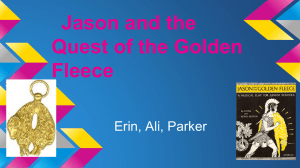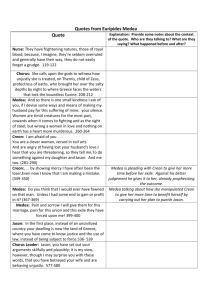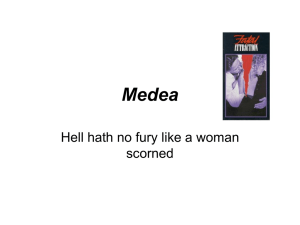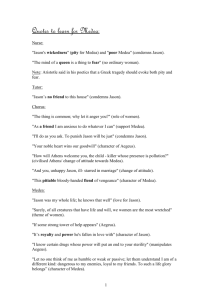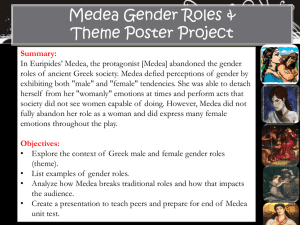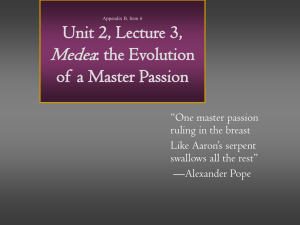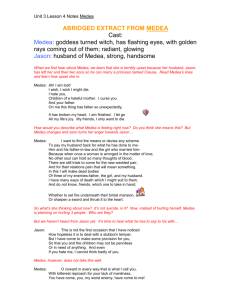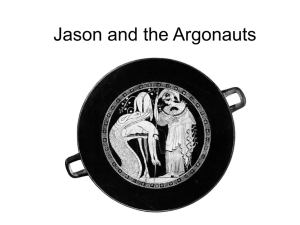Medea Thesis Paper
advertisement
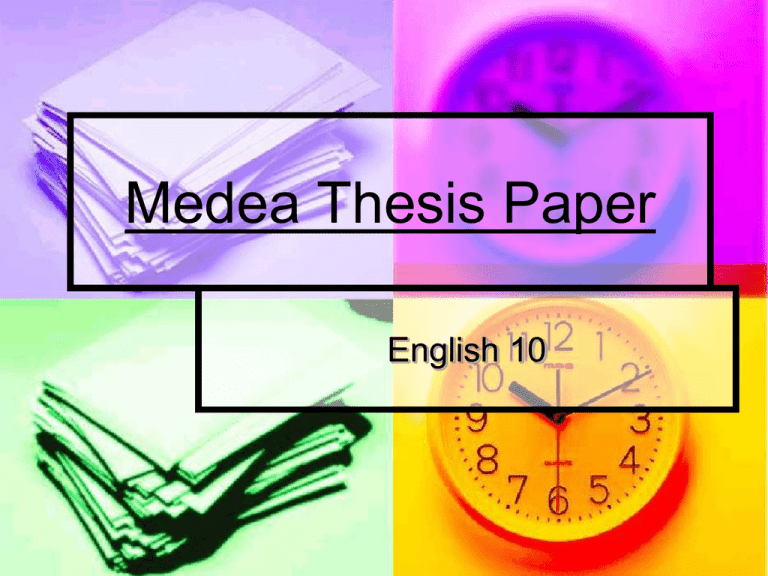
Medea Thesis Paper English 10 Use class discussion to help you formulate your ideas about Medea and Jason Character “Jason and the Argonauts” Myth Medea by Euripides Medea Jason In this essay you will compare 1 character from their portrayal in the myth to who they become in the play. Begin by filling out the graphic organizer below in regards to character traits. Next, choose one character, write an introduction paragraph following the model below and lastly make a thesis statement explaining why you think the character you chose changed between the myth and the play. Brain Storm: What are reasons for why both Medea and Jason changes between the myth and the story? Reasons for Change in Medea’s Character Reasons for Change in Jason’s Character Your Essay Outline: 1 Introduction = Summarize both myths, introduce a character and explain how their situation has changed. Write Thesis Statement (Give 3 changes within the character of your choice.) Body P 1: 1st change in character. Body P 2: 2nd change in character. Body P 3: 3rd change in character. 5 Conclusion Introduction Paragraph Checklist Introduction Paragraph Attention Getter Titles of myth and play (with author) Brief summary of myth involving selected character Brief summary of play involving selected character Thesis statement Example Introduction Paragraph (Attention Getter) The British playwright, William Congreve, said it best in his play, The Mourning Bride, “Hell hath no fury like a woman scorned.” (Summary of myth) In the “Jason and the Argonauts” myth, Jason, the hero, seeks the Golden Fleece that is held sacred by Colchis; lovingly, Princess Medea of Colchis aids Jason in his task. (Summary of Play) In Euripides’ play, Princess Medea of Colchis (and Priestess of Hecate) becomes a betrayed queen, who has already been exiled from her home land and Jason’s homeland of Iolcus. In the play Medea, the mythical Greek hero known as Jason prepares to marry Princess Glauce of Corinth to secure a throne for power and wealth. (Thesis) Callously, Jason makes his marital plans without telling his wife, Medea, and their two sons. Therefore, Medea becomes a vengeful, proud, and murderous scorned princess without a throne or a place to call home. Note how the thesis statement forecasts the content of the following body paragraphs. Moving on from your Introduction: 1 (Thesis) Medea becomes a vengeful, proud, and murderous scorned princess without a throne or a place to call home. Body P 1: Medea as vengeful Body P 2: Medea as Proud Body P 3: Medea as Murderous 5 Conclusion Body Paragraph Checklist Body Paragraphs 1-3 Restatement of part of thesis Summarize character from myth Summarize 1 character trait from play Give quote Explain quote Example Body Paragraphs (Arguments) (Restatement of part of thesis) When Jason leaves Medea, one of the first changes the audience notices is that she becomes vengeful. (Summary of myth) In “Jason and the Argonauts” Medea was portrayed as something of a heroine. Originally, Medea was renowned for being clever as she helped Jason fight against unspeakable odds. (Summary of new trait) In Contrast, Medea in the play, now actually has something to be vengeful for—she has been betrayed by who she thought was the love of her life. (Quote) Medea, for example after speaking to Creon the king of Corinth stated, “Everything’s set in every way against me. But don’t imagine this is all – not yet…I’ve time to turn three enemies to corpses—The father and the daughter, and my husband” (Euripedes 79). (Explanation) Medea is now planning to use her clever wits in the a divisive plot to kill all who have insulted her. Unlike her earlier role as heroine, Medea now treads in morally grey area as neither the audience, nor the Chorus can wholeheartedly approve of her revenge. Repeat the process within 2 more body paragraphs. Active and Academic Verbs to Use in Critical Literary Analysis Emphasizes Creates Juxtaposes Identifies Clarifies Echoes Balances Elucidates Illustrates Implies Organizes Contrasts Develops Relates Compares Exemplifies Alludes to Reinforces Argues Connotes Expresses Suggests Parallels Observes Defines Mirrors Focuses Insinuates Conclusion Checklist Body Paragraphs 1-3 Restatement of thesis Borrow information and points made from paragraphs End with final thoughts or a quote explaining the chorus or societal views. Grading Rubric Category 25 20 15 10 Focus on Topic Maintains exceptional focus on the topic; has a one sentence thesis statement that clearly answers the prompt Maintains consistent focus Provides inconsistent Demonstrates little or no on the topic & has a one focus on the topic & thesis focus & no thesis sentence thesis statement statement is unclear statement. that answers the prompt. Support for Relevant, quality details give the Topic (Content) reader important information that goes beyond the obvious or predictable. Supporting details and information are relevant, but one key issue or portion of the storyline is unsupported. Supporting details and information are relevant, but several key issues or portions of the storyline are unsupported. Supporting details and information are typically unclear or not related to the topic. Quote Use The writer successfully uses one or two quotes throughout the paper. The quotes are proficiently introduced and analyzed. The writer attempts to use quotations but not effectively . The writer made no attempt to use contextual support. Writer makes 3 errors in grammar or spelling. The writer uses somewhat effective language and sentences/phrases slightly vary in length & structure. A slight deviation from MLA citation. Writer makes 4 mistakes in grammar or spelling. The writer uses somewhat effective language and sentences/phrases which slightly vary in length and structure. Negligent MLA citation. Writer makes more than 4 errors in grammar or spelling. The sentences/phrases do not vary in length and structure. No MLA citation The writer successfully uses at least one quotation as contextual support for each argument within their thesis statement. The writer displays a distinguished competency when introducing and analyzing quotes being used. Grammar, Style Writer makes no errors in & MLA grammar or spelling. The writer uses effective language and sentences/phrases which appropriately vary in length & structure. No errors in MLA citations.
